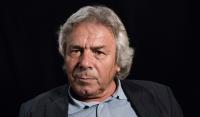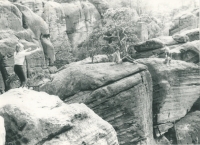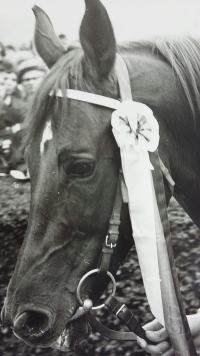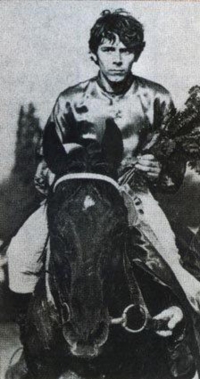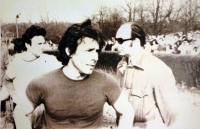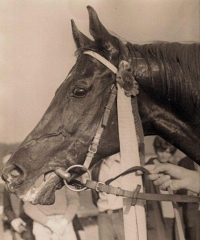Ing. Václav Chaloupka
* 1948
-
“In Motěšice, we chose Láska, it had been called Lotka back then, and we chose Kámoš. And then there was this Korok, a nice little horse with such an amazing glint in its eye. But it was handicapped. Its leg was bended, its carpal joint damaged. And as it walked it almost looked like as if it would have a limp. But it came from this outstanding breed. Its father was Astyanax and its mother Cosyria, descendants of one of the best French horses which were ever used for breeding. Astyanax´s father had maybe the best blood in the whole world. And Korok already had those excellent siblings which did well on the fences. So we got Korok as this kind of an extra. We bought all of the three horses.”
-
“It has to be demanding. As in case we would make it easier again and again, we would end up on just a flat ground. People climb Mount Everest knowing they could die there, and they have been doing it still. Just as horses need demanding disciplines so they won´t degenerate and will remain beautiful. Our duty is to take good care of them, as if they were top athletes. We had to feed them well, treat them well, train them well, we had to get them ready for the race. And if something would happen, that´s just fate, it´s all chance. If a horse is well-prepared, it will manage to finish the race. And the rider has to be prepared as well of course. I won about twenty-five big races with Korok without injuries. He was lucky.”
-
“There was an alarm going around the barracks that the Russians were coming. And I would say that our commander in Mikulov was a brave man. He ordered the gate to be blocked by tanks. On the next day there was this petition being singed against the Russian army invasion and everyone would support it I would say. And the tanks stood in the gate for maybe a month. The point was not to start a military conflict. We couldn´t leave the barracks and we also couldn´t let the Russians in.”
-
"We were so upset because of 1968. And in 1969, this group of excellent Russian riders came to compete in the Grand Pardubice Steeplechase, and they felt sorry about what had happened in 1968. They were upset and almost afraid to talk to us. As sportsmen, they had a really bad time back then. But they didn´t do well during the race and the crowds were so delighted. Which was unsportsmanlike yet understandable, as people were cheering if a Russian rider would have fallen down. That was how it went. And after winning the race, Korok and me had almost become national heroes of sorts. Even president Svoboda was there. He invited me to his box and said: 'Oh boy, you saved us the day.'”
-
“Was it hard to get to the National... to Liverpool?” - “No, not at all. They were quite interested in our horse racing abroad. They were excited that this boy from the East would show up there.” - “It has been claimed that you were the first Czech to go there...” - “Yes, during the communist regime. But before the war, this captain Popler had been racing there. And he had to go by train, back then, that poor devil, not like us who went by car, so it took him much more time to get there.” - “And why were you the first to get there?” - “As you had to be brave enough. To be able to tell whether the horse would handle it. As the there are many quite demanding jumps in the Grand National. If you made a mistake, you would kill the horse. As there were those spikes and if the horse would snag on them it would fall on the head. It could break its neck. The hedges we had here were much more forgiving. Taxis was a hard one, maybe the most demanding jump in the world during my career, but it was just more comfortable than to jump some of those mounds. The word was that Liverpool was like terribly demanding. And you couldn´t tell by watching the race on film. You had to experience this for yourself.”
-
“We used to go abroad. Our chairman sent people abroad to learn. We would go to Paris, for example, or to Lausanne. Everyone had an assignment. For example, I would make photos of starting booths in Paris, we would measure them and then produce them in Slušovice. And there were many such employees who had to obtain information about new developments in the fields of their expertise, about those interesting machines, so we could build them in Slušovice.” - “How was it possible that Slušovice Coop had been so famous and successful?” - “I would attribute that to the personality of František Čuba, our chairman. As his motto was that everything could be accomplished, you just had to try hard enough and be willing to get yourself thrown out. Once, five times, a hundred times. But you had to accomplish your goal. He also wore glasses and looked much like Štrougal. And there was this word that he had been somehow related to Štrougal and that legend keep on growing. As some people were indeed afraid that Čuba had some important friends due to his relationship with Štrougal. Which he didn´t, yet they created this aura around him. And he was able to employ capable people. All those who were forced to leave the Party after 1968. After that, they had been working in Slušovice. He gave opportunities to capable people who knew their jobs. He protected them in a way so everyone could do his job and do it well.” - “Did he make you an offer face to face?” - “Yes. We both got the offer. My brother and I. His brother Josef Čuba came to a meeting and we talked. He didn´ t even believe that I would be interested. Later, my brother told me that it would be better if I would go. That he would took over Šinkvice after me. So we made this agreement and I left for Slušovice.”
-
Celé nahrávky
-
Praha, 22.06.2018
(audio)
délka: 01:30:37
-
Praha, 28.06.2018
(audio)
délka: 01:45:45
Celé nahrávky jsou k dispozici pouze pro přihlášené uživatele.
At first, horses were considered remnants of the bourgeois order
Václav Chaloupka was born on July 6th 1948 in Těšany near Brno, a son of Václav and Marie Chaloupka. His father came from a family of farmers but had to train as an upholsterer as his oldest brother inherited the farm as the custom dictated at the time. His mother was a housewife. Václav has five siblings. Along with his brother, Jiří, he developed love for horses since early childhood. He was universally talented, as became evident since his early age, excelling both in Flat Racing and Jump Racing. At the age of sixteen he encountered Korok, the horse of his life, with whom he won his first Grand Pardubice Steeplechase (Velká pardubická) in 1969. After he bested the Soviet riders during the Soviet occupation, he was celebrated across the nation. He participated in the Grand Pardubice Steeplechase eighteen-times, winning four-times and assuming second place three-times. He was the sole rider from totalitarian Czechoslovakia to ever participate in the Grand National Steeplechase Liverpool. Since 1979, he was employed at the Slušovice Agricultural Coop (JZD Slušovice) as a trainer. He won eighty-nine races in total and had also succeeded as a trainer. Since 1987, he led the horse-racing centre in Velká Chuchle. After 1989, he became a horse-race trainer in Tochovice and reestablished local breeding herd. He also leased the horse racing track in Karlovy Vary with his associates. In his free time he does bowling, and apart from horses he also loves dogs.
